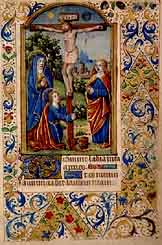Medieval Manuscript
The medieval Book of Hours evolved out of the monastic cycle of prayer which divided the day into eight segments, or "hours": Matins, Lauds, Prime, Terce, Sext, Nones, Compline, and Vespers. By the early fifteenth century, the format of the Book of Hours had developed to satisfy the demands of private, as opposed to communal, devotion. These portable books are smaller in format than their monastic forebears, designed for use by individuals, with a liturgical system somewhat less complicated than monastic liturgy and more "user-friendly." A Book of Hours invariably begins with a liturgical calendar, listing feast days in chronological order along with a complicated method of calculating the date of Easter. The seven Penitential Psalms are usually included as well, and additional prayers (devoted to particular saints or personal issues) according to the desires and needs of the owner.








No comments:
Post a Comment